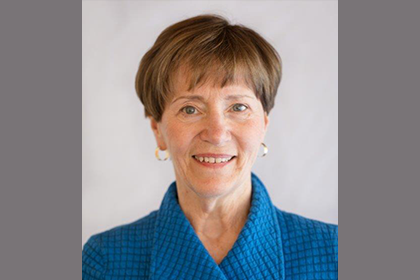Patricia King, M.D., Ph.D., UVM professor of medicine and former chair of the Federation of State Medical Boards (FSMB), led and created the Workgroup on Physician Sexual Misconduct, which conducted a deep review of all available U.S. sexual misconduct disciplinary data, and state medical board physician sexual misconduct laws, policies and procedures might be contributing to this dire problem. Their findings were reported in 2020 and featured in an April 27, 2021 JAMA Viewpoint article.

Patricia King, M.D., Ph.D.
Sexual misconduct by medical professionals has been a longstanding issue, but rose to new levels of public consciousness in 2015 when news of sexual abuse by U.S.A. women’s gymnastics team doctor Larry Nassar hit the headlines.
Later, in 2016, an investigation conducted by the Atlanta Journal-Constitution uncovered evidence of medical regulators neglecting to hold thousands of U.S. doctors accountable for sexually violating their patients. In response to those reports, Patricia King, M.D., Ph.D., University of Vermont professor of medicine and then chair-elect of the Federation of State Medical Boards (FSMB), quickly got to work.
No stranger to state medical board regulatory work, King was a member–and chair–of the Vermont Board of Medicine for 12 years before her election to the FSMB, where she served as one of the organization’s few women chairs from 2018 to 2019.
Established in 1912, the FSMB is a national non-profit organization that represents and supports state medical boards “through education, assessment, research and advocacy while providing services and initiatives that promote patient safety, quality health care and regulatory best practices.” The organization, which jointly owns the United States Medical Licensing Examination with the National Board of Medical Examiners®, had not updated its sexual misconduct policy since 2006.
The 2006 policy report “wasn’t inclusive enough of all issues,” says King, who called physician sexual misconduct “an incredibly important issue for our state medical boards and also for maintaining public trust and public protection,” during a FSMB Spotlight video interview in December 2018.
King led and established the FSMB Workgroup on Physician Sexual Misconduct in 2017. The group not only conducted a deep review of all available U.S. sexual misconduct disciplinary data, but also figured out how state medical boards’ laws, policies and procedures might be contributing to this dire problem. Their tasks also included revamping the FSMB policy statement and ensuring training and resources were in place to educate medical trainees and professionals.
For the working group, she gathered representatives from 12 state medical boards, the public, American Medical Association, and American Osteopathic Association, as well as subject matter experts. Over the course of 18 months, the group’s meetings featured guests from the Association of American Medical Colleges, American Association of Colleges of Osteopathic Medicine, medical students, trauma experts, trauma investigation experts and—most significantly—survivors of sexual misconduct by physicians.
“We deconstructed what boards do,” says King. The group examined the following: how do boards receive complaints; how do boards investigate and conduct trauma-informed investigation; how can boards reduce barriers to reporting. King says the team determined that “people don’t know what boards do and don’t know what a proper exam is” and saw broad disparity among state boards’ statutes of limitation for reporting, as well as varying laws regarding the required levels of proof for making a finding.
The FSMB working group and FSMB staff’s two years of work yielded a landmark report, which was accepted by the state medical boards’ House of Delegates in 2020 and has driven changes in laws and state medical board approaches across the country, including major changes in Georgia.
The over-arching goals of the group’s recommendations, says King, are transparency to the public; improving the public’s knowledge of state boards; increasing reporting by hospitals and other health professionals; implementing trauma-informed investigation procedures and removing time limits; and enacting strict disciplinary measures. In addition, the report emphasizes the importance of having all stakeholders across the continuum of medicine work together to promote and build a culture that does not tolerate sexual misconduct in any form.
Education for both state medical boards and patients was a big focus for the group. In fact, says King, FSMB created a website – www.docinfo.org – where patients can check their doctors’ disciplinary record, which was featured in a 2018 Consumer Reports article. The group also recognized the imperative role of medical professionals’ ethical “duty to report.”
“Complaints can come from other doctors and hospitals,” explains King. “Past offenders are at highest risk of sexual misconduct. The earlier you interrupt the better.”
At Larner, King developed sessions on “professionalism and the state medical boards’ role in medical licensing and discipline” with the support of a 2012-2014 Frymoyer scholarship. Since 2014, she has led these sessions for third and fourth year students addressing the role of state medical boards in medical licensing, discipline, and public protection. In late June, she led a “Prep for Practice” session with Class of 2022 medical students, which covered “duty to report” and other aspects of the workgroup’s recommendations.
“This isn’t something people like to talk about,” admits King. “It takes the whole culture, which is so huge, in order to really change. The state boards are there to protect public trust and the public gives us trust. It’s important to be transparent and open to the public.”
King was lead author for an April 27, 2021 JAMA “Viewpoint” commentary, titled “State Medical Board Recommendations for Stronger Approaches to Sexual Misconduct by Physicians,” which outlines the group’s recommendations.
In addition to her role as chair of the physician sexual misconduct workgroup, King has also served as chair of the Workgroup on Education about Medical Regulation and on a wide variety of other FSMB committees and workgroups. She is also the director of Convergence, the final course in the Foundations level of the Vermont Integrated Curriculum.